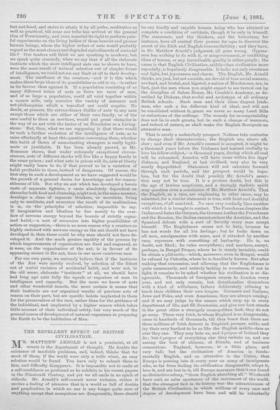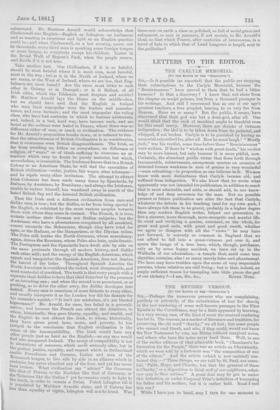THE REPELLENT EFFECT OF BRITISH CIVILISATION.
MR. MATTHEW ARNOLD is not a pessimist, at all events in the department of thought. He doubts the existence of insoluble problems, and, indeed, thinks that for most of them, if the world were only a trifle wiser, an easy solution would be found. You have only to submit them to him, and difficulty disappears. It is impossible not to smile at a self-confidence so profound as he exhibits in his recent papers in the Nineteenth Century, and yet we all smile in no spirit of ridicule. Mr. Arnold's self-conceit never irritates, rather it excites a feeling of pleasure that in a world so full of doubts and perplexities, in which no one is any longer quite sure of anything except that mosquitoes are disagreeable, there should
be one kindly and capable human being who has attained so complete a condition of certitude, though it be only in himself. The statesmen, and the thinkers, and the historians, for instance, have all exerted their powers for ages to discover the secret of the Irish and English irreconcilability ; and they have, in Mr. Matthew Arnold's judgment, all gone wrong. Oppres- sion has nothing to do with it, or misgovernment, or conflicting ideas of tenure, or any ineradicable quality in either people ; the cause is that English Civilisation, middle-class civilisation more especially, is hopelessly disagreeable. It lacks not only sweetness and light, but joyousness and charm. The English, Mr. Arnold thinks, are just, but not amiable, are devoid of true social manner, are hard, and brutal, and bigoted, a nation of Murdstouos, are, in fact, just the men whom you might expect to see turned out by the discipline of Salem House, Mr. Creakle's Academy, as de- scribed by Dickens, that model and archetype of all ordinary British schools. Such men and their ideas disgust Irish. men, who seek a far different kind of ideal, and will not be conciliated without it, grant we never so many Land Bills or reductions of the suffrage. The remedy for incomputability does not lie in such grants, but in such a change of manners, and indeed of nature, as shall make the English Bourgeois an attractive man.
That is surely a melancholy prospect. Nations take centuries to change their characteristics ; the English aro, above all, slow ; and even if Mr. Arnold's counsel is accepted, it might be a thousand years before the Irishman had learned cordially to love his fellow-subject,—a thousand years, during which all coal will be exhausted, America will have come within five days' distance, and England, at last civilised, may also be very nearly depopulated. Statesmen will not calculate forward through such periods, and the prospect would be hope- lees, but for the doubt that possibly Mr. Arnold's asser• tion may not be true. It is a profane doubt, but this is the age of lawless scepticism, and a daringly realistic spirit may question even a conclusion of Mr. Matthew Arnold's. That the English, as a race, are unpleasing to other races, may be admitted, for a similar statement is true, with faint and doubtful exceptions, of all mankind. No race very cordially likes another with which it is brought in contact. The Frenchman despises the Italian and hates the German, the German loathes the Frenchman and the Russian, the Italian cannot endure the Austrian, and the Spaniard detests with a sort of ferocity every man except himself. The Englishman seems not to hate, because he has not words for all his feelings ; but he looks down on all men, amalgamates with none, and if attacked by another race, represses with something of barbarity. He is, no doubt, not liked ; he rules everywhere ; and nowhere, except, perhaps, in Bengal Proper, where he is nearly invisible, could he obtain a plebiecite,—which, moreover, even in Bengal, would be refused by Calcutta, where he is familiarly known. But after making that concession, and allowing that the Englishman is quite unmannerly, and entirely lacking in sweetness, if not in light, it remains to be asked whether his civilisation is so dis- agreeable. Thousands of foreigners swarm to London every year, and not only remain, but denationalise themselves with a kind of wilfulness, fathers deliberately refusing to teach their children their own tongue. Germans and Italians, Jews and Poles, and even Americans, they are always coming ; and if we may judge by the names which crop up in every department of life, and fill directories, and give our best streets in the great cities a strangely cosmopolitan look, they do not go away. These very Irish, to whom England is so disagreeable, come in hundreds of thousands, till they boast that there are three millions of Irish descent in England, prosper, settle, and try their very hardest to be as like the English middle-class as ever they can. They may hate us, and apropos of Ireland they do ; but a propos of everything else they imitate us, and are among the best of citizens, of friends, and of business
connections. England, however, is a little place, and very full; but the civilisation of America is funda- mentally English, and so attractive is the Union, that Europe is pouring into it every year an army of immigrants who, so far from finding its civilisation disagreeable, adopt it, love it, and are lost in it, till Europe murmurs that it can found no distinctive colony, "those English absorbing all." We should have said, as calm spectators of the movement of the world, that the strangest fact in its history was the attractiveness of the British Civilisation, in which millions of every race and degree of development have boon and will be voluntarily submerged. Mr. Matthew Arnold would acknowledge that Clerkenwell was English—English as Islington—as barbarous and as wanting in sweetness and light as an English quartier could be ; and when Clerkenwell, on a hot evening, pours out its thousands, every third man is speaking some foreign tongue or some brogue, to everybody except his children. Listen in the Broad Walk of Regent's Park, when the people swarm, and decide if it is not true.
Take another test. Our Civilisation, if it is so hateful, should be most hateful where it is most seen, most forceful, most in the way ; but is it in the North of Ireland, where we are many, or the West of Ireland, where we are few, that Eng- lishmen are most hated P Are the races most bitter to each other in Galway or in Donegal ; or is it Belfast, of all Irish cities, which the Irishman most despises and avoids P Mr. Matthew Arnold lays the blame on the middle-class, but wo should have said that the English in Ireland who were least unpopular were the traders and manufac- turers, and evou farmers ; and the most unpopular the ruling class, who have had centuries in which to become aristocrats, and, indeed, in a bad, hard way, have become such, and are hated as the noblesse were hated in France, where there was no difference either of race, or creed, or civilisation. The evidence for Mr. Arnold's proposition breaks down, or is reduced to this : that the attractiveness of British Civilisation is so considerable, that it overcomes even British disagreeableness. The Irish, so far from avoiding us, follow us everywhere, no difference of religion, of "ways," or of ideals sufficing to overcome an at- traction which may no doubt be purely material, but which, nevertheless, is irresistible. The Irishman knows that in a British Colony or an American State, he will find the specialties of British civilisation—order, justice, fair wages, utter tolerance— and he repels every other invitation. The attempt to attract Irish Colonists has been made many times by Spaniards, by Italians, by Austrians, by Brazilians ; and always the Irishman, unable to endure himself, has wandered away in search of the hated British flag and the detested British civilisation.
That the Irish seek a different civilisation from ours and dislike ours, is true ; but the dislike, so far from being special to the English, is exhibited by the most various peoples towards those with whom they come in contact. The French, it is true, irritate neither their German nor Italian subjects ; but the Austrians, who have a pleasantness recognised by all mankind, cannot reconcile the Bohemians, though they have tried for ages, or the Italians, or the Hungarians, or the Illyrian tribes. The Poles still loathe the North-Germans, whose ascendancy, again, drives the Russians, whom Poles also hate, quite frantic. The Portuguese and the Spaniards have dwelt side by side on the same peninsula through all modern history, and dislike each other still; and the energy of the English-American, which appals and vanquishes the Spanish-American, does not deaden the hatred of the latter. Throughout Spanish America the North-American is considered the rudest, most disagreeable, and most masterful of mankind. The truth is that every people with a separate ideal dislikes to have that ideal disturbed by the presence of an intruding one ; and when the second is so prominent, or so pushing, as to drive the other awry, the dislike developer into hatred. Every race is conscious of some distaste to every other, and usually interprets it as the London boy did his distaste for his comrade's squint,—" It isn't yer misfortun, it's yer blasted hignorance !" Mr. Arnold, for once, has failed in a generali- sation; and because the French can attract the Alsatians, to whom, historically, they gave liberty, equality, and wealth, and the English do not attract the Irish, to whom, historically, they have given penal laws, scorn, and poverty, he has jumped to the conclusion that English civilisation is the cause of the incompatibility. The Irish would hate any other people just as hard as the English,—as any race would find who conquered Ireland. The secret of compatibility is not in alterations of manners, which never seriously alter, but in the perfect justice, equality, and respect which in Switzerland enable Frenchman and German, Italian and man of the Romansch tongue, to live side by side in an alliance which in centuries has never absorbed any of the four, and yet has never been broken. What civilisation can " attract" the Genevese like that of France, or the Zuricher like that of Germany, or the Ticinense like the Italian P yet he remains ready to fight to the death, in order to remain a Swiss. Polish Islington till it is populated by Matthew Arnolds alone, and if Galway has less than equality of rights, Islington will not be loved. Was
there over on earth a class so polished, so full of social grace and refinement, so near in manners, if not morals, to Mr. Arnold's ideal, as that which France, after centuries of intercourse, in a burst of hate to which that of Land Leaguers is torpid, sent to the guillotine ?



































 Previous page
Previous page